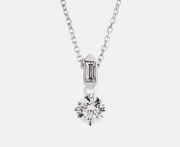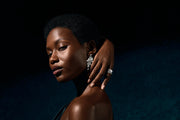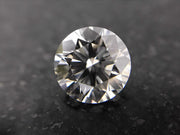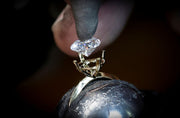Photo: Rich Dieckhoff
, 2021
Many lab-grown diamond companies claim their products are better for the environment than mined diamonds. But New York City–based Aether Diamonds, which debuted online in late December, goes a step further. The brand claims to be the first company to produce “carbon-negative diamonds.” [...]
The brainchild of David Yurman alums Ryan Shearman and Dan Wojno, Aether Diamonds is among a growing cohort of lab-grown diamond jewelry brands that prefers to bypass wholesale channels and market their goods direct to consumers.
The diamond trade “always stuck out in my mind as an industry that should be disrupted in a big way,” Shearman tells JCK. “This is something I kept playing around with in my head, until eventually, Dan and I were having a conversation about air pollution, and it occurred to us that the carbon that’s warming our atmosphere isn’t all that different from the carbon that makes up a diamond. Inspired by this idea and enabled by our collective experience in the jewelry world, we set in motion what would eventually be Aether Diamonds.”
The fledgling company, which says it grows its diamonds in the United States, brought on two additional cofounders, chief technology officer Anthony Ippolito and chief marketing officer Robert Hagemann, before launching the site with two evergreen collections, Commitment and Masculine, and one signature collection, Earthly Pleasures, that prove that fashion-forward design and lab-grown diamonds are not mutually exclusive.
Shearman and Hagemann answered a host of questions for JCK over email. The interview has been edited and condensed.
<> Does the brand sell loose stones or strictly finished jewelry? <>
Shearman: Right now, we only sell finished jewelry. Our goal is to soon be able to offer our diamonds through a wholesale business to brand partners who see the value in what we offer. We’re really viewing our first group of wholesale customers as strategic partners: brands who recognize the shortcomings of the current diamond industry and who want to take steps to not just reduce their impact, but to actually help reverse climate change through the jewelry they create.
<> Where is the brand currently sold? <>
Hagemann: Right now, we’re only sold through our website, aetherdiamonds.com. It’s important as a new brand that we be able to create a meaningful experience and offer the right types of education to our shoppers, who have often come to us because they’re looking for a new way of shopping for jewelry. Once we’ve been able to build awareness for Aether and develop more recognition for the brand, then we’ll look at other channels through which we will sell our jewelry.
<> Can you explain how the technology works in layman’s terms? What exactly is “carbon sequestration”? Is it patented? <>
Shearman: Essentially, it’s a three-part process. First is the carbon capture. We work with a partner company that operates direct air capture units, which are giant vacuums that pull in air from the atmosphere. That air is passed through a special filter that traps carbon dioxide and other polluting elements. We then take the CO2 from them and put it through our second stage, which involves turning the carbon from the CO2 into a usable form for creating diamonds, called a hydrocarbon.
Our last stage is using the hydrocarbon as our raw material for creating our diamonds in CVD (chemical vapor deposition) reactors. We’ve applied for several patents on the process and have several trademarks and copyrights in place as well.
Carbon sequestration is any method by which you can take excess carbon from the atmosphere and capture it in a stable form that can’t escape back into the air and harm the environment. Our diamonds sequester carbon, but so do a lot of other methods that we use to supplement our process, such as underground mineralization of carbon and reforestation initiatives.
<> How are your carbon-negative diamonds certified and by whom? <>
Shearman: We work with the International Gemological Institute, the world’s largest independent laboratory for testing and grading gemstones. They certify all of our diamonds the same way they would any other diamonds, whether mined or lab-grown.
We also partner with Natural Capital Partners, an independent third party that evaluates our diamond-making process and its carbon impact. We’re proud to say that our diamonds themselves are the world’s first carbon-negative in the world: They remove carbon from the atmosphere and are created through sourcing sustainable energy. We still need to rely on offsetting the impact of logistics and administrative operations for now, but our goal is to be a fully independently carbon-negative company by 2023. That’s a target we are committed to achieving, and we plan to generate our own green energy, send excess green energy to the grid, and condense our logistics footprint as much as possible. As a public benefit corporation that’s in the process of becoming a certified B Corp., we plan to leave the world a cleaner and more beautiful place than we found it.
<> Tell us about your collections. Who designs them? Are you working with any “name” designers? <>
Hagemann: For now, our Earthly Pleasures collection is serving as our signature collection. introduced for the brand launch. Our Commitment and Masculine collections will be evergreen, and we’ll add to them over time as we continue to create even more designs. It’s important to note that we specifically use the words “Commitment” and “Masculine,” instead of “engagement” and “men’s,” to be in line with the vision we have for the jewelry industry. The world is finally starting to realize that humans have such an enormous range and fluidity of identity, gender, orientation, lifestyle, etc., and that old labels and categorizations often no longer hold true.
Our head designer is Jenna Housby. She’s fabulously talented and has been able to capture the ethos of what we’re doing with the brand in every single piece of jewelry she’s created.
<> Tell me about Aether’s design ethos and the emphasis on “airy” styles. Are the diamonds always mounted in 18k Fairmined gold? <>
Hagemann: That’s certainly a huge part of what we’re going for, as an homage to the origins of our diamonds, which are created from air. We also blended that into the concept of negative space, [which] embodies the thought that there’s always significance in the space between: of something being “in the ether,” of the opportunity that exists from one moment to the next, of the things that are unspoken yet eminently felt.
We also lean into the concept of skin as canvas for our jewelry designs. Not only does this allow us to explore the artistry of jewelry in a unique way, but it also serves as a symbol of the integration of the human element with the earthly elements. It’s a reminder that human beings are part of this planet, and the planet is a part of us. It reminds us that we have a duty as caretakers for the Earth, and that our impact can either be a positive one or a negative one depending on our choices. All of our jewelry is made with Fairmined gold, which is responsibly sourced and has the highest standards for human rights and environmental impact.
<> How have customers reacted to Aether? <>
Shearman: The demand for our jewelry was so huge right from the beginning that we needed to implement a waitlist just so we could manage the sheer amount of interest in our diamonds. We also have data from our customers that shows the driving reason behind their purchase of an Aether diamond is the environmental impact they can have. It can’t be understated how important this is. It means that customers are committed to making a difference, want more transparency when shopping for diamond jewelry, and are willing to choose positive change with their purchase decision.
The community of people who are working to fight climate change and improve the environment is one of the most active, powerful, and committed communities you will ever find, and we’re so proud to be a part of that.
<> How do the prices of your jewels compare to similar collections featuring mined diamonds? <>
Shearman: If you look at luxury diamond jewelry brands that feature mined diamonds, you’ll find that a ring they sell for around $13,000 to $14,000 would cost around $8,000 for a comparable piece from Aether.
We are priced a bit higher than your average middle-market lab-grown diamond brand, though. Our process for creating our diamonds does cost a bit more because we rely on truly sustainable technologies to create our raw materials and power our reactors, rather than relying on cheaper fossil fuels.
<> How are you marketing Aether? <>
Hagemann: We want to shout our mission and vision from the rooftops, but we also acknowledge that we’re still starting out and need to scale rapidly in order to meet the demand we’ve received. The last thing we would ever want to do is have customers on our waitlist feel as if our focus is to go out and drive more pre-orders while they’re still waiting for their order to be fulfilled.
<> Finally, tell us about your approach to packaging. <>
Hagemann: Every element of our packaging was painstakingly developed to ensure that the method of presentation for our jewelry was just as eco-minded as our diamonds themselves. We use a plant-derived ultra suede on the exterior of our jewelry boxes, FSC-certified recycled paper structures, and an interior made from sustainable wool felt. We hope that our customers will keep and reuse their Aether jewelry boxes for a lifetime, but if they don’t, all but the recyclable exterior is biodegradable.




